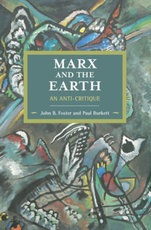
Marx and the Earth
An Anti-Critique
Burkett, Paul; Foster, John Bellamy
Date Written: 2016-01-18
Publisher: Brill
Year First Published: 2016
Year Published: 2017
Pages: 308pp ISBN: 9789004229242
Dewey: 306.3/45-dc23
Resource Type: Book
Cx Number: CX20150
John Bellamy Foster and Paul Burkett respond to recent ecosocialist criticisms of Marx, offering a full-fledged anti-critique. They thus extend their earlier pioneering work on Marx’s ecology, providing the basis for a new red-green synthesis.
Abstract:
--
Table of Contents:
Preface
Introduction
Chapter 1 The Dialectic of Organic and Inorganic Relations
Chapter 2 The Origins of Ecological Economics: Podolinsky and Marx-Engels
Chapter 3 Classical Marxism and Energetics
Chapter 4 Engels, Entropy, and the Heat Death Hypothesis
Chapter 5 The Reproduction of Economy and Society
Conclusion: Marx and Metabolic Restoration
Appendix I:
Sergei Podolinsky, 'Socialism and the Unity of Physical Forces'
(Translated from the Italian)
Appendix II
Sergei Podolinsky, 'Human Labour and Unity of Force'
(Translated from the German)
Bibliography
Index
Publisher's description:
A decade and a half ago John Bellamy Foster and Paul Burkett introduced a new, revolutionary understanding of the ecological foundations of Marx’s thought, demonstrating that Marx’s concepts of the universal metabolism of nature, social metabolism, and metabolic rift prefigured much of modern systems ecology. Ecological relations were shown to be central to Marx’s critique of capitalism, including his value analysis. Now in Marx and the Earth Foster and Burkett expand on this analysis in the process of responding to recent ecosocialist criticisms of Marx. The result is a full-fledged anti-critique—pointing to the crucial roles that dialectics, open-system thermodynamics, intrinsic value, and aesthetic understandings played in the original Marxian critique, holding out the possibility of a new red-green synthesis.
Subject Headings


